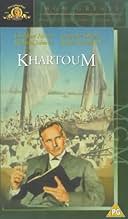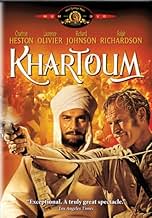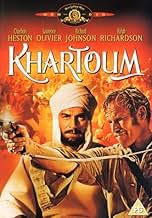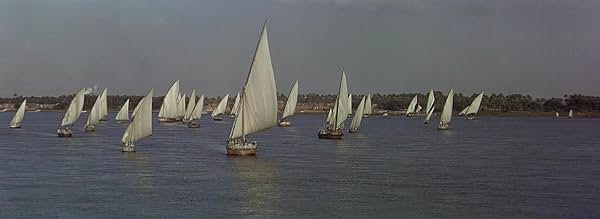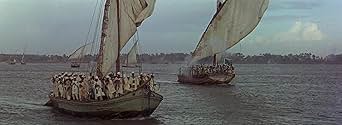Khartoum
- 1966
- Tous publics
- 2h 14m
In the Sudan, in 1884 to 1885, Egyptian forces led by British General Charles "Chinese" Gordon (Charlton Heston) defend Khartoum against an invading Muslim Army led by a religious fanatic, M... Read allIn the Sudan, in 1884 to 1885, Egyptian forces led by British General Charles "Chinese" Gordon (Charlton Heston) defend Khartoum against an invading Muslim Army led by a religious fanatic, Mohammed Ahmed el Mahdi (Sir Laurence Olivier).In the Sudan, in 1884 to 1885, Egyptian forces led by British General Charles "Chinese" Gordon (Charlton Heston) defend Khartoum against an invading Muslim Army led by a religious fanatic, Mohammed Ahmed el Mahdi (Sir Laurence Olivier).
- Directors
- Writer
- Stars
- Nominated for 1 Oscar
- 3 nominations total
- Herbin
- (uncredited)
- assistant, messenger to Gordon
- (uncredited)
- Directors
- Writer
- All cast & crew
- Production, box office & more at IMDbPro
Featured reviews
I first saw this some years ago and found it impressive but maybe I've seen Lawrence of Arabia too often in the interim. It owes a lot of Lawrence, appearing as it did four years after. As in Lawrence,a lone British officer is sent to the desert to set things straight. He's mysterious, a paradox. He rides camels and gets into battles with the enemy. He fails in his mission.
Well, Charlton Heston as "Chinese" Gordon doesn't really seem too mysterious when you come down to it, even though he himself tells us, "My life is not an open book. Not to you, not to any man. Not even to myself." Yet he's a pretty normal guy. People keep calling him "vain" behind his back but it doesn't seem like vanity to me when you're trapped behind the lines and expect the British, who sent you there in the first place, to come and get you out.
Actually Heston is pretty good. His mass is imposing. His uniforms are splendiferous. His acting doesn't shoot out the lights but he's convincing because Gordon is well within his range. Olivier, as the Mahdi, "the expected one," the kind of rabid charismatic warrior that religions seem to generate on a regular basis, gives a little better performance because, let's face it, he's a more efficient ham. You killed to prevent killing, he tells Gorden. "I kill to prevent more killing. Tell me, Gordon Pasha, where is the difference?" And he holds both his hands up and gives them a little twist, while looking slyly out of the corner of his eyes at Heston. For Heston such techniques would be infra dig. Olivier plays this in blackface, by the way. All of the Egyptians, as well as the Sudanese, are in blackface. Man, these Egyptians are dark. Not just swarthy. Not even dark like sub-Saharan Africa is dark, but a shiny bluish-black like a freshly polished boot.
It's not a bad film and it does describe Gordon and his predicament in intelligible terms. We're never at a loss for what's going on. But Lawrence of Arabia, inevitably, keeps springing to mind. And Khartoum seems plodding by comparison, especially in the direction. You may remember, to take a single example, the scene in which Lawrence and his irregulars blow up a train and then puncture the cars with machine gun bullets. Lawrence shouts for them to cease fire because the passenger cars are being turned into lacework. Nobody hears him, so he fires a flare. No one pays attention, so Lawrence must run out in front of his own guns screaming at his men to stop shooting. Finally the firing sputters raggedly to a stop.
There's nothing like that here. In this movie, Gordon generals a battle on horseback with the Madhi's supporters and everybody -- every one of the extras -- runs to his mark and does what he's supposed to. The battles are full of the same extras in long shot, slashing away at each other with scimitars or whatever they are. Nobody seems to get dirty. The dialogue is strictly functional. And one has to think of Lean's USE of the desert setting. That fulsomely ominous vermilion sun peeking up over the flat spirit level of a horizon at dawn. We have the desert here too, but it might almost have been a painted backdrop. It isn't a presence. Dearden uses a lot of swooping helicopter shots as if to say, "Wow -- what a vast emptiness." But we don't get to KNOW it. We don't get to see its rocks or its animals or is leisurely dust devils. It might as well be a studio jungle as a desert.
The score is good, though. It borrows from Eric Wolfgang Korngold but it's effective -- sweeping, majestic, and rife with breast-bursting button-popping imperial sentiment.
In the end it's a watchable epic movie. If you haven't seen Lawrence of Arabia, rent the two of them and show them in succession -- if you can stay awake that long. It's the difference between a good-enough movie and a great movie.
Gordon is a Christian with the Bible constantly under his arm... A national hero who abolished slavery in China... An honest man revered by the British, as well as by the foreigners... A martyr-warrior who ever truly loves the Sudan and cannot, under 'his' God, leave it to the misery and the sickness of which he once cured it...
Gladstone ((Ralph Richardson) decides not to send troops to the trouble area... Instead he will send General Gordon... Gladstone realizes if Gordon is sent to Khartoum and fails to prevent a massacre, it is he who will be blamed; not the Briish government... For heroes are supposed to perform miracles...
En route to Khartoum, Gordon discovers that most of Britain's allies and friends of his former exploits now support the mystic Mahdi... But when Gordon with Col. Stewart (Richard Johnson) finally reach Khartoum, the people give him a warm welcome... They feel their problems must soon be over now that Gordon Pasha has arrived...
Things, however, do not go as planned... Khartoum runs out of food... The Mahdi's men infiltrate the city... And Gordon seek a plan...
Lawrence Olivier is superb as the fanatical Arab leader, Muhammed Ahmed Al Mahdi, the Expected-One... His softly glowing black eyes never blink... His measured voice spreads holy terrors: "I have been instructed by the Lord Mohammed, Peace be upon Him, to worship in the Khartoum mosque. Therefore I must take Khartoum by the sword."
With outstanding color photography, exquisite sets and costumes, "Khartoum" has great moments:
- The bloody and brutal massacre of an entire army in a burning desert...
- The Gordon/Mahdi meeting... The only non-historic element of the film which, in fact, never took place - contributes enormously to the dramatic effect of the motion picture.
- The raid on the Mahdi's own supplies...
- The exodus of all foreigners and Europeans out of the city...
With an Oscar-Nominated script mounted on a grand scale, "Khartoum" is an epic entertainment, a fine and powerful motion picture...
The exploits, the single-handed capacity Gordon Pasha displayed again and again to control large groups of people quite unarmed and alone, is almost magical; quite scary, in fact...
The picture has extraordinary interpretations from main actors . Charlton Heston as the thoughtful and impulsive General Charles George Gordon is top-notch and Laurence Olivier as the fanatic Muslim is awesome . Heston actually did bear a remarkable resemblance to Major General Gordon , but he was considerably taller than the real Gordon . While Laurence Olivier has an extreme make-up to incarnate the religious fanatic , Ahmed El Mahdi , ¨the Expected One¨ . The support cast is equally outstanding , thus : Ralph Richardson (as Gladstone), Nigel Green (Wolsey) , Peter Arne (Kitchener) , among others . The film was based on facts , though was really criticized for neglecting to mention the many very good reasons why Prime Minister Gladstone was reluctant to send an army into the Sudan . The colorful and shimmer cinematography by Edward Scaife is magnificent , being well reflected in desert landscapes ; it was shot in Ultra Panavision , though was later reduced for exhibition in 70mm and 35mm release prints . Production design is overwhelming , it is the best part of the film , including a giant screen originally exhibited in Cinerama venues . Battles staged by Yakima Canutt are spellbound and spectacular . Frank Cordell's musical score is rousing and impressively adjusted to historical film . The motion picture was perfectly directed by Basil Dearden , though Lewis Gilbert was attached as director at one point . The yarn will appeal to historic epic buffs and Charlton Heston fans . Rating : Very Good . Above average, well worth watching .
Did you know
- TriviaKhartoum (1966) was analyzed by David Levering Lewis in the 1995 book "Past Imperfect: History According to the Movies," edited by Mark C. Carnes. The article notes that producer Julian Blaustein sent a copy of the script to the real-life Mahdi's grandson, who responded that although his grandfather and General Charles "Chinese" Gordon never actually met, "...it's a very fine script." When Blaustein apologized for this error, the grandson replied, "Ah, but Mr. Blaustein, they should have."
- GoofsPrime Minister Gladstone is shown in Parliament sitting on a red bench. The benches of the House of Commons have traditionally always been green.
- Quotes
Col. J.D.H. Stewart: Why did you let them talk you into this mission?
Gen. Charles 'Chinese' Gordon: As is well known, I, ah..regard myself as a religious man, yet I belong to no church. I'm an able soldier, yet I abhor armies. I can even add that I've been introduced to hundreds of women, but never married. in other words, no one's ever talked me into anything.
- Alternate versionsThe cinema version was uncut but UK video and DVD releases were cut by 29 secs by the BBFC to edit footage of dangerous horsefalls.
- ConnectionsEdited into Au coeur du temps: Raiders from Outer Space (1967)
- How long is Khartoum?Powered by Alexa
Details
- Release date
- Country of origin
- Language
- Also known as
- Khartoum - Aufstand am Nil
- Filming locations
- Production company
- See more company credits at IMDbPro
Box office
- Budget
- $6,000,000 (estimated)
- Runtime2 hours 14 minutes
- Aspect ratio
- 2.76 : 1
Contribute to this page




